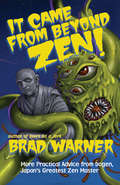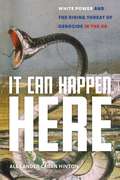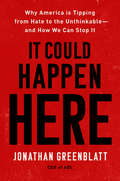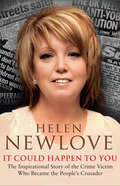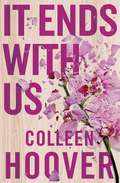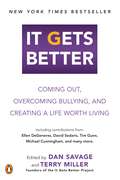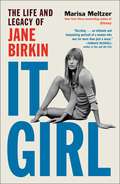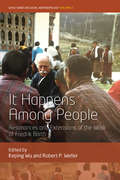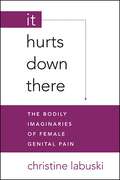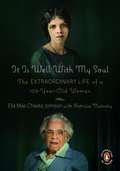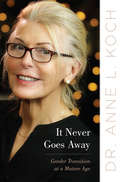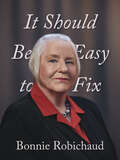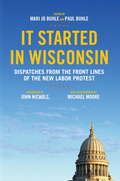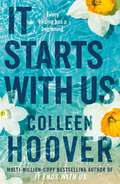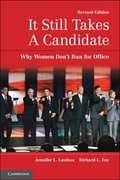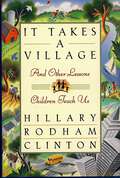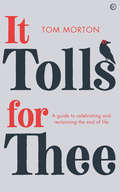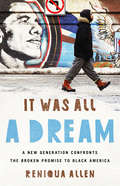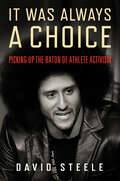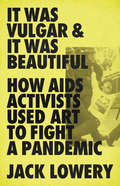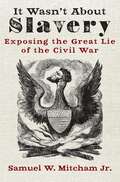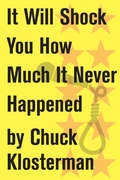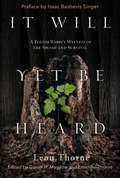- Table View
- List View
It Came from Beyond Zen!: More Practical Advice from Dogen, Japan's Greatest Zen Master
by Brad WarnerVol. 2 of Brad Warner’s Radical but Reverent Paraphrasing of Dogen’s Treasury of the True Dharma EyeIn Japan in 1253, one of the great thinkers of his time died — and the world barely noticed. That man was the Zen monk Eihei Dogen. For centuries his main work, Shobogenzo, languished in obscurity, locked away in remote monasteries until scholars rediscovered it in the twentieth century. What took so long? In Brad Warner’s view, Dogen was too ahead of his time to find an appreciative audience. To bring Dogen’s work to a bigger readership, Warner began paraphrasing Shobogenzo, recasting it in simple, everyday language. The first part of this project resulted in Don’t Be a Jerk, and now Warner presents this second volume, It Came from Beyond Zen! Once again, Warner uses wry humor and incisive commentary to bridge the gap between past and present, making Dogen’s words clearer and more relevant than ever before.
It Can Happen Here: White Power and the Rising Threat of Genocide in the US
by Alexander Laban HintonA renowned expert on genocide argues that there is a real risk of violent atrocities happening in the United States If many people were shocked by Donald Trump’s 2016 election, many more were stunned when, months later, white supremacists took to the streets of Charlottesville, Virginia, chanting “Blood and Soil” and “Jews will not replace us!” Like Trump, the Charlottesville marchers were dismissed as aberrations—crazed extremists who did not represent the real US. It Can Happen Here demonstrates that, rather than being exceptional, such white power extremism and the violent atrocities linked to it are a part of American history. And, alarmingly, they remain a very real threat to the US today. Alexander Hinton explains how murky politics, structural racism, the promotion of American exceptionalism, and a belief that the US has have achieved a color-blind society have diverted attention from the deep roots of white supremacist violence in the US’s brutal past. Drawing on his years of research and teaching on mass violence, Hinton details the warning signs of impending genocide and atrocity crimes, the tools used by ideologues to fan the flames of hate, the origins of the far-right extremist ideas of white genocide and replacement, and the shocking ways in which “us” versus “them” violence is supported by racist institutions and policies. It Can Happen Here is an essential new assessment of the dangers of contemporary white power extremism in the United States. While revealing the threat of genocide and atrocity crimes that loom over the country, Hinton offers actions we can take to prevent it from happening, illuminating a hopeful path forward for a nation in crisis.
It Changed My Life: Writings on the Women's Movement
by Betty FriedanBetty Friedan writes on her experiences starting and maintaining the women's liberation movement.
It Could Happen Here: Why America Is Tipping from Hate to the Unthinkable—And How We Can Stop It
by Jonathan Greenblatt"Refreshingly candid . . . Get off Instagram and read this book."—Sacha Baron Cohen From the dynamic head of ADL, an impassioned argument about the terrifying path that America finds itself on today—and how we can save ourselves It&’s almost impossible to imagine that unbridled hate and systematic violence could come for us or our families. But it has happened in our lifetimes in Europe, the Middle East, Africa, and Asia. And it could happen here. Today, as CEO of the storied ADL (the Anti-Defamation League), Jonathan Greenblatt has made it his personal mission to demonstrate how antisemitism, racism, and other insidious forms of intolerance can destroy a society, taking root as quiet prejudices but mutating over time into horrific acts of brutality. In this urgent book, Greenblatt sounds an alarm, warning that this age-old trend is gathering momentum in the United States—and that violence on an even larger, more catastrophic scale could be just around the corner. But it doesn&’t have to be this way. Drawing on ADL&’s decades of experience in fighting hate through investigative research, education programs, and legislative victories as well as his own personal story and his background in business and government, Greenblatt offers a bracing primer on how we—as individuals, as organizations, and as a society—can strike back against hate. Just because it could happen here, he shows, does not mean that the unthinkable is inevitable.
It Could Happen to You: The Inspirational Story of the Crime Victim Who Became the People's Crusader
by Helen NewloveWhen Helen was 20, she met Garry Newlove at a local disco. They married in 1986 and had three daughters. On 10 August 2007, Garry was brutally beaten by a gang of youths outside the family home in Warrington. He died two days later. It was an act of violence that shocked the nation and would have a profound impact on the lives of Helen and her children.After the ordeal of a ten-week trial and the murder conviction of three youths, Helen held a press conference, giving a speech that attracted national media attention and propelled her into the role of a campaigner for victims’ rights and against the lawlessness that blights so many of our towns and cities.In 2010, Helen was appointed a seat in the House of Lords among some of the most powerful and influential people in the country. Today, she is Baroness Newlove of Warrington, a tireless campaigner against antisocial behaviour and for the rights of victims and witnesses.In this engaging memoir, Helen recounts how her family was shattered by Garry’s murder and how good unexpectedly came out of evil. Her remarkable story is not one of politics and committees; it is about real people and the impact that crime has on us all.
It Ends With Us: The emotional #1 Sunday Times bestseller. Now a major film starring Blake Lively and Justin Baldoni
by Colleen Hoover**NOW A MAJOR MOTION PICTURE STARRING BLAKE LIVELY AND JUSTIN BALDONI** THE RUNAWAY GLOBAL MULTI-MILLION COPY BESTSELLING NOVEL BY COLLEEN HOOVER. &‘The reigning queen of BookTok&’ GUARDIAN &‘One of the most influential voices of the last decade&’ ELLE &‘One of the world's most successful writers&’ DAILY MAIL &‘In the future . . . if by some miracle you ever find yourself in the position to fall in love again . . . fall in love with me.&’ Lily hasn&’t always had it easy, but that&’s never stopped her from working hard for the life she wants. She&’s come a long way from the small town where she grew up—she graduated from college, moved to Boston, and started her own business. And when she feels a spark with a gorgeous neurosurgeon named Ryle Kincaid, everything in Lily&’s life seems too good to be true. Ryle is assertive, stubborn, maybe even a little arrogant. He&’s also sensitive, brilliant, and has a total soft spot for Lily. And the way he looks in scrubs certainly doesn&’t hurt. Lily can&’t get him out of her head. But Ryle&’s complete aversion to relationships is disturbing. Even as Lily finds herself becoming the exception to his &“no dating&” rule, she can&’t help but wonder what made him that way in the first place. As questions about her new relationship overwhelm her, so do thoughts of Atlas Corrigan—her first love and a link to the past she left behind. He was her kindred spirit, her protector. When Atlas suddenly reappears, everything Lily has built with Ryle is threatened.With this bold and deeply personal novel, IT ENDS WITH US is a heart-wrenching story and an unforgettable tale of love that comes at the ultimate price. Don't miss IT STARTS WITH US, the sequel to IT ENDS WITH US. Available now! Colleen Hoover, It Ends with Us Number 1 Sunday Times bestseller January 2023 (UK)
It Gets Better: Coming Out, Overcoming Bullying, and Creating a Life Worth Living
by Dan Savage Terry MillerEvery story can change a life. Growing up isn't easy. Many young people face daily tormenting and bullying, and this is especially true for LGBT kids and teens. <P><P>In response to a number of tragic suicides by LGBT students, syndicated columnist and author Dan Savage uploaded a video to YouTube with his partner, Terry Miller. Speaking openly about the bullying they suffered, and how they both went on to lead rewarding adult lives, their video launched the It Gets Better Project YouTube channel and initiated a worldwide phenomenon. <P><P>It Gets Better is a collection of original essays and expanded testimonials written to teens from celebrities, political leaders, and everyday people, because while many LGBT teens can't see a positive future for themselves, we can.
It Gets Better: Coming Out, Overcoming Bullying, and Creating a Life Worth Living
by Dan Savage Terry MillerEvery story can change a life. Watch a video Growing up isn't easy. Many young people face daily tormenting and bullying, making them feel like they have nowhere to turn. This is especially true for LGBT kids and teens who often hide their sexuality for fear of bullying. Without other openly gay adults and mentors in their lives, they can't imagine what their future may hold. In many instances, gay and lesbian adolescents are taunted - even tortured - simply for being themselves. After a number of tragic suicides by LGBT students who were bullied in school, syndicated columnist and author Dan Savage uploaded a video to YouTube with his partner Terry Miller to inspire hope for LGBT youth facing harassment. Speaking openly about the bullying they suffered as teenagers, and how they both went on to lead rewarding adult lives, their video launched the It Gets Better Project YouTube channel and initiated a worldwide phenomenon. With over 6,000 videos posted and over 20 million views in the first three months alone, the world has embraced the opportunity to provide personal, honest and heartfelt support for LGBT youth everywhere. It Gets Better is a collection of expanded essays and new material from celebrities, everyday people and teens who have posted videos of encouragement, as well as new contributors who have yet to post videos to the site. While many of these teens couldn't see a positive future for themselves, we can. We can show LGBT youth the levels of happiness, potential and positivity their lives will reach if they can just get through their teen years. By sharing these stories, It Gets Better reminds teenagers in the LGBT community that they are not alone - and it WILL get better.
It Girl: The Life and Legacy of Jane Birkin
by Marisa MeltzerA Most Anticipated Book of 2025: Town & Country • Harper&’s Bazaar • W Magazine • Bustle • LitHub • Women&’s Wear Daily The first comprehensive biography of Jane Birkin—actress, singer, and legendary style icon—and her profound cultural impact, from the &“acerbic, culturally astute, and genuine&” (The New York Times) author of the instant New York Times bestseller Glossy.Jane Birkin was synonymous with chic. Her effortless style and artistic legacy have been immortalized through her music and film career. And, of course, she was the inspiration behind one of the world&’s most coveted bags, the Hermès Birkin. But who was the real woman behind the it girl? Now, New York Times bestselling author Marisa Meltzer sheds new light on Birkin&’s enigmatic life and explores her profound influence on generations in a rigorously reported biography unlike any other. It Girl paints a vivid portrait of Birkin and her profound legacy, from her early years in 1960s London to her rise as a beloved celebrity in France, detailing personal challenges, her relationships with creative powerhouses, and the duality of her public and private selves. Based on interviews and deep archival research, Meltzer reveals the nuances of Birkin&’s character: her famously tempestuous romantic relationships, life with her three famous daughters, and the creative energy that drove her. It Girl tells the story of her indelible impact on femininity and style, and how what we think of as French girl style grew from her. Far from being just a muse, Birkin is at last given her well-deserved due.
It Happens Among People: Resonances and Extensions of the Work of Fredrik Barth (WYSE Series in Social Anthropology #8)
by Robert P. Weller Keping WuWritten by eleven leading anthropologists from around the world, this volume extends the insights of Fredrik Barth, one of the most important anthropologists of the twentieth century, to push even further at the frontiers of anthropology and honor his memory. As a collection, the chapters thus expand Barth’s pioneering work on values, further develop his insights on human agency and its potential creativity, as well as continuing to develop the relevance for his work as a way of thinking about and beyond the state. The work is grounded on his insistence that theory should grow only from observed life.
It Hurts Down There: The Bodily Imaginaries of Female Genital Pain
by Christine LabuskiHow does a woman describe a part of her body that much of society teaches her to never discuss? It Hurts Down There analyzes the largest known set of qualitative research data about vulvar pain conditions. It tells the story of one hundred women who struggled with this dilemma as they sought treatment for chronic and unexplained vulvar pain. Christine Labuski argues that the medical condition of vulvar pain cannot be adequately understood without exposing and interrogating cultural attitudes about female genitalia. The author's dual positioning as cultural anthropologist and former nurse practitioner strengthens her argument that discourses about "healthy" vulvas naturalize and reproduce heteronormative associations between genitalia, sex, and gender.
It Is Well with My Soul
by Patricia Johnson Ella Mae Cheeks MulcahyAn African American centenarian who saw W. E. B. Du Bois speak in 1924 and attended President Barack Obama’s inauguration in 2009 shares wisdom from a life well lived during a crucial period in American history Ella Mae Cheeks Johnson was an inspirational, dynamic, and one-of-a-kind woman, whose ordinary life was nothing less than extraordinary throughout the course of her 106 years. A graduate of Case Western Reserve University, Ella Mae was the child of former slaves and experienced the best and worst of the past century in America—from the Jim Crow era and the Great Depression to the inauguration of President Barack Obama in 2009, which she memorably attended. Through it all, she endured—and thrived—by adhering to the example of the Good Samaritan: the belief that compassion is the key to the good life and offering to help without expecting payback brings its own rewards. In It Is Well with My Soul, Ella Mae Cheeks Johnson shares her insights on living a long and enjoyable life and her hopes for the future. .
It Never Goes Away: Gender Transition at a Mature Age
by Anne Lauren KochIf you are transgendered, the feeling of wanting your body to match the sex you feel you are never goes away. For some, though, especially those who grew up before trans people were widely out and advocating for equality, these feelings were often compartmentalized and rarely acted upon. Now that gender reassignment has become much more commonplace, many of these people may feel increasing pressure to finally undergo the procedures they have always secretly wanted. Ken Koch was one of those people. Married twice, a veteran, and a world traveler, a health scare when he was sixty-three prompted him to acknowledge the feelings that had plagued him since he was a small child. By undergoing a host of procedures, he radically changed his appearance and became Anne Koch. In the process though, Anne lost everything that Ken had accomplished. She had to remake herself from the ground up. Hoping to help other people in her age bracket who may be considering transitioning, Anne describes the step by step procedures that she underwent, and shares the cost to her personal life, in order to show seniors that although it is never too late to become the person you always knew you were, it is better to go into that new life prepared for some serious challenges. Both a fascinating memoir of a well-educated man growing up trans yet repressed in the mid-twentieth century, and a guidebook to navigating the tricky waters of gender reassignment as a senior, It Never Goes Away shows how what we see in the television world of Transparent translates in real life.
It Should Be Easy to Fix
by Bonnie RobichaudIn 1977, Bonnie Robichaud accepted a job at the Department of Defence military base in North Bay, Ontario. After a string of dead-end jobs, with five young children at home, Robichaud was ecstatic to have found a unionized job with steady pay, benefits, and vacation time. After her supervisor began to sexually harass and intimidate her, her story could have followed the same course as countless women before her: endure, stay silent, and eventually quit. Instead, Robichaud filed a complaint after her probation period was up. When a high-ranking officer said she was the only one who had ever complained, Robichaud said, “Good. Then it should be easy to fix.” This timely and revelatory memoir follows her gruelling eleven-year fight for justice, which was won in the Supreme Court of Canada. The unanimous decision set a historic legal precedent that employers are responsible for maintaining a respectful and harassment-free workplace. Robichaud’s story is a landmark piece of Canadian labour history—one that is more relevant today than ever.
It Started in Wisconsin
by Michael Moore John Nichols Paul Buhle Mari Jo Buhle Patrick BarrettIn the spring of 2011, Wisconsinites took to the streets in what became the largest and liveliest labor demonstrations in modern American history. Protesters in the Middle East sent greetings--and pizzas--to the thousands occupying the Capitol building in Madison, and 150,000 demonstrators converged on the city.In a year that has seen a revival of protest in America, here is a riveting account of the first great wave of grassroots resistance to the corporate restructuring of the Great Recession.It Started in Wisconsin includes eyewitness reports by striking teachers, students, and others (such as Wisconsin-born musician Tom Morello), as well as essays explaining Wisconsin's progressive legacy by acclaimed historians. The book lays bare the national corporate campaign that crafted Wisconsin's anti-union legislation and similar laws across the country, and it conveys the infectious esprit de corps that pervaded the protests with original pictures and comics.
It Starts with Us: the highly anticipated sequel to IT ENDS WITH US (It Ends With Us Ser. #3)
by Colleen HooverBefore It Ends with Us, it started with Atlas. Multi-million copy bestselling author Colleen Hoover tells fan favourite Atlas&’s side of the story and shares what comes next in this long-anticipated sequel to the #1 Sunday Times bestseller It Ends with Us Lily and her ex-husband, Ryle, have just settled into a civil co-parenting rhythm when she suddenly bumps into her first love, Atlas, again. After nearly two years separated, she is elated that for once, time is on their side, and she immediately says yes when Atlas asks her on a date. But her excitement is quickly hampered by the knowledge that, though they are no longer married, Ryle is still very much a part of her life—and Atlas Corrigan is the one man he will hate being in his ex-wife and daughter&’s life. Switching between the perspectives of Lily and Atlas, It Starts with Us picks up right where the epilogue for the bestselling phenomenon It Ends with Us left off. Experience the romantic and satisfying conclusion to Colleen Hoover's powerful global bestselling novel, It Ends with Us.
It Still Takes A Candidate
by Jennifer L. Lawless Richard L. FoxIt Still Takes a Candidate serves as the only systematic, nationwide empirical account of the manner in which gender affects political ambition. Based on data from the Citizen Political Ambition Panel Study, a national survey conducted of almost 3,800 "potential candidates" in 2001 and a second survey of more than 2,000 of these same individuals in 2008, Jennifer L. Lawless and Richard L. Fox find that women, even in the highest tiers of professional accomplishment, are substantially less likely than men to demonstrate ambition to seek elective office. Women are less likely than men to be recruited to run for office. They are less likely than men to think they are qualified to run for office. And they are less likely than men to express a willingness to run for office in the future. This gender gap in political ambition persists across generations and over time. Despite cultural evolution and society's changing attitudes toward women in politics, running for public office remains a much less attractive and feasible endeavor for women than men.
It Takes a Village: Picture Book (with Audio Recording)
by Hillary Rodham ClintonIn celebration of the tenth anniversary of It Takes a Village, this splendid edition includes photographs and a new Introduction by Hillary Rodham Clinton.A decade ago, then First Lady Hillary Rodham Clinton chronicled her quest—both deeply personal and, in the truest sense, public—to help make our society into the kind of village that enables children to become smart, able, resilient adults. It Takes a Village is “a textbook for caring....Filled with truths that are worth a read, and a reread” (The Dallas Morning News). For more than thirty-five years, Senator Clinton has made children her passion and her cause. Her long experience—not only through her roles as mother, daughter, sister, and wife but also as advocate, legal expert, and public servant—has strengthened her conviction that how children develop and what they need to succeed are inextricably entwined with the society in which they live and how well it sustains and supports its families and individuals. In other words, it takes a village to raise a child. In her new Introduction, Senator Clinton reflects on how our village has changed over the last decade—from the impact of the Internet to new research in early child development and education. She discusses issues of increasing concern—security, the environment, the national debt—and looks at where we have made progress and where there is still work to be done. It Takes a Village has become a classic. As relevant as ever, this anniversary edition makes it abundantly clear that the choices we make today about how we raise our children and how we support families will determine how our nation will face the challenges of this century.
It Tolls For Thee: A guide to celebrating and reclaiming the end of life
by Tom MortonA funeral celebrant's story about how celebrating death, and creating personalised space for grief, can enrich lives and give meaning to death.After a close encounter with death, Tom Morton realised he needed a change of pace and perspective. He decided to become the only independent funeral celebrant on the remote Shetland Islands, an unusual new profession that would lead him on an extraordinary journey into the world of the dead. In a vivid narrative that reveals the fascinating realm of the unspoken - from extraordinary undertakers and death cafés, to pilgrimages and taboos - Tom quickly learns that death and speaking for the dead requires you to think on your feet and often take a magpie approach to faith and philosophy. From Humanism to hymns, Theravada Buddhism to Star Wars theology, he discovers the importance of ritual, humour, and the empowering act of trying to find words for something beyond language itself.This is an accessible and thought-provoking guide to celebrating mortality. When grief must be an inevitable part of life, Tom shows how we can mourn together in a way that feels appropriate to the life of the one who has passed on, and ultimately cultivate a healthy attitude to our own eventual demise.
It Was All a Dream: A New Generation Confronts the Broken Promise to Black America
by Reniqua AllenYoung Black Americans have been trying to realize the promise of the American Dream for centuries and coping with the reality of its limitations for just as long. Now, a new generation is pursuing success, happiness, and freedom -- on their own terms. In It Was All a Dream, Reniqua Allen tells the stories of Black millennials searching for a better future in spite of racist policies that have closed off traditional versions of success. Many watched their parents and grandparents play by the rules, only to sink deeper and deeper into debt. They witnessed their elders fight to escape cycles of oppression for more promising prospects, largely to no avail. Today, in this post-Obama era, they face a critical turning point.Interweaving her own experience with those of young Black Americans in cities and towns from New York to Los Angeles and Bluefield, West Virginia to Chicago, Allen shares surprising stories of hope and ingenuity. Instead of accepting downward mobility, Black millennials are flipping the script and rejecting White America's standards. Whether it means moving away from cities and heading South, hustling in the entertainment industry, challenging ideas about gender and sexuality, or building activist networks, they are determined to forge their own path. Compassionate and deeply reported, It Was All a Dream is a celebration of a generation's doggedness against all odds, as they fight for a country in which their dreams can become a reality.
It Was Always a Choice: Picking Up the Baton of Athlete Activism
by David SteeleThe recent flashpoint of Colin Kaepernick taking a knee renews a long tradition of athlete-activists speaking out against racism, injustice, and oppression. Like Kaepernick, Jackie Robinson, Paul Robeson, Muhammad Ali, Bill Russell, Tommie Smith, and John Carlos—among many others, of all races, male and female, pro and amateur—all made the choice to take a side to command public awareness and attention rather than “shut up and play,” as O. J. Simpson, Michael Jordan, and Tiger Woods did. Using their celebrity to demand change, these activists inspired fans but faced great personal and professional risks in doing so. It Was Always a Choice traces the history and impact of these decisive moments throughout the history of U.S. sports. David Steele identifies the resonances and antecedents throughout the twentieth century of the choices faced by athletes in the post-Kaepernick era, including the advance of athletes’ political organizing in the era of activism following the death of George Floyd. He shows which athletes chose silence instead of action—“dropping the baton,” as it were—in the movement to end racial inequities and violence against Black Americans. The examples of courageous athletes multiply as LeBron James, Megan Rapinoe and the activist-athletes of the NBA, WNBA, and NFL remain committed to fighting daily and vibrantly for social change.
It Was Vulgar and It Was Beautiful: How AIDS Activists Used Art to Fight a Pandemic
by Jack LoweryShortlisted for the J. Anthony Lukas PrizeThe story of art collective Gran Fury—which fought back during the AIDS crisis through direct action and community-made propaganda—offers lessons in love and grief. In the late 1980s, the AIDS pandemic was annihilating queer people, intravenous drug users, and communities of color in America, and disinformation about the disease ran rampant. Out of the activist group ACT UP (AIDS Coalition to Unleash Power), an art collective that called itself Gran Fury formed to campaign against corporate greed, government inaction, stigma, and public indifference to the epidemic. Writer Jack Lowery examines Gran Fury&’s art and activism from iconic images like the &“Kissing Doesn&’t Kill&” poster to the act of dropping piles of fake bills onto the trading floor of the New York Stock Exchange. Lowery offers a complex, moving portrait of a collective and its members, who built essential solidarities with each other and whose lives evidenced the profound trauma of enduring the AIDS crisis. Gran Fury and ACT UP&’s strategies are still used frequently by the activists leading contemporary movements. In an era when structural violence and the devastation of COVID-19 continue to target the most vulnerable, this belief in the power of public art and action persists.
It Wasn't About Slavery: Exposing the Great Lie of the Civil War
by Samuel W. Mitcham Jr.The Great Lie of the Civil War If you think the Civil War was fought to end slavery, you&’ve been duped. In fact, as distinguished military historian Samuel Mitcham argues in his provocative new book, It Wasn&’t About Slavery, no political party advocated freeing the slaves in the presidential election of 1860. The Republican Party platform opposed the expansion of slavery to the western states, but it did not embrace abolition. The real cause of the war was a dispute over money and self-determination. Before the Civil War, the South financed most of the federal government—because the federal government was funded by tariffs, which were paid disproportionately by the agricultural South that imported manufactured goods. Yet, most federal government spending and subsidies benefited the North. The South wanted a more limited federal government and lower tariffs—the ideals of Thomas Jefferson—and when the South could not get that, it opted for independence. Lincoln was unprepared when the Southern states seceded, and force was the only way to bring them—and their tariff money—back. That was the real cause of the war. A well-documented and compelling read by a master historian, It Wasn&’t About Slavery will change the way you think about Abraham Lincoln, the Emancipation Proclamation, and the cause and legacy of America&’s momentous Civil War.
It Will Shock You How Much It Never Happened
by Chuck KlostermanOriginally collected in Eating the Dinosaur and now available both as a stand-alone essay and in the ebook collection Chuck Klosterman on Media and Culture, this essay is about advertising.
It Will Yet Be Heard: A Polish Rabbi's Witness of the Shoah and Survival
by Leon ThorneNobel laureate Isaac Bashevis Singer once described Dr. Leon Thorne’s memoir as a work of “bitter truth” that he compared favorably to the works of Tolstoy, Dostoevsky, and Proust. Out of print for over forty years, this lost classic of Holocaust literature now reappears in a revised, annotated edition, including both Thorne’s original 1961 memoir Out of the Ashes: The Story of a Survivor and his previously unpublished accounts of his arduous postwar experiences in Germany and Poland. Rabbi Thorne composed his memoir under extraordinary conditions, confined to a small underground bunker below a Polish peasant’s pigsty. But, It Will Yet Be Heard is remarkable not only for the story of its composition, but also for its moral clarity and complexity. A deeply religious man, Rabbi Thorne bore witness to forced labor camps, human degradation, and the murders of entire communities. And once he emerged from hiding, he grappled not only with survivor’s guilt, but also with the lingering antisemitism and anti-Jewish violence in Poland even after the war ended. Harrowing, moving, and deeply insightful, Rabbi Thorne’s firsthand account offers a rediscovered perspective on the twentieth century’s greatest tragedy.
